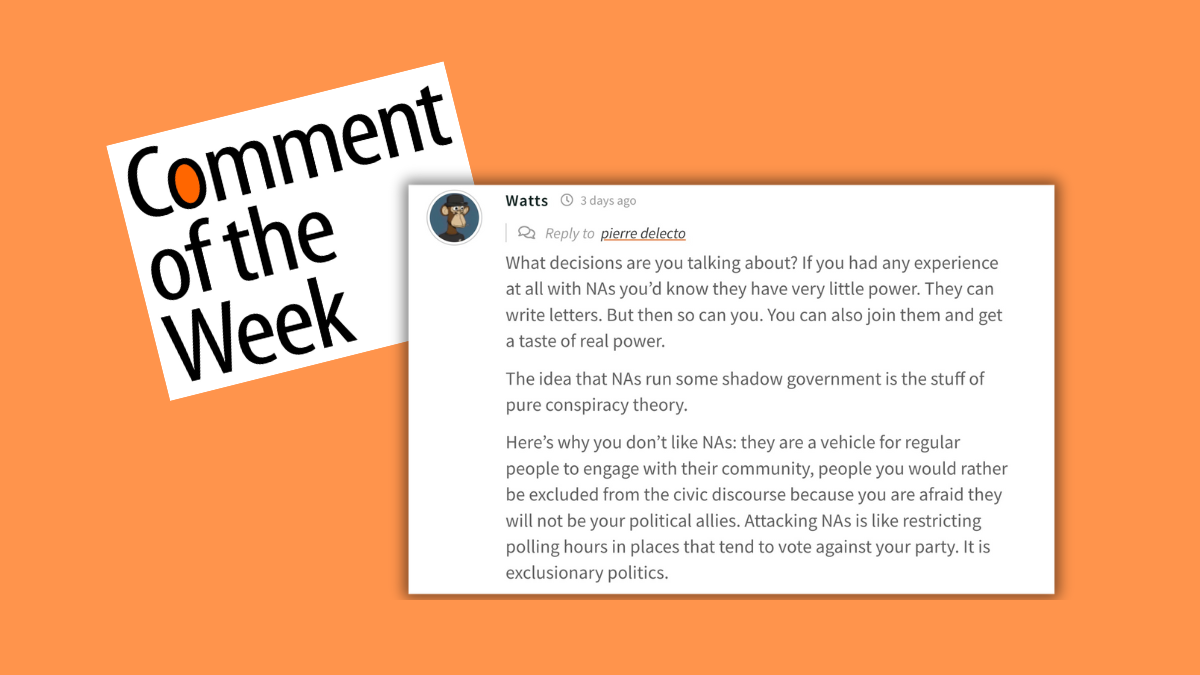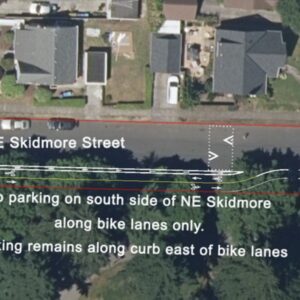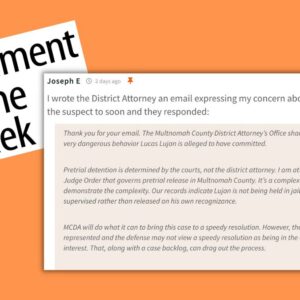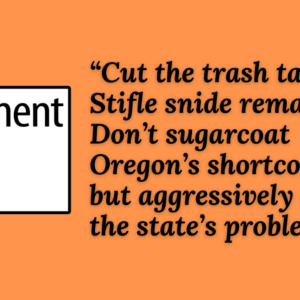Welcome to the Comment of the Week, where we highlight good comments in order to inspire more of them. You can help us choose our next one by replying with “comment of the week” to any comment you think deserves recognition. Please note: These selections are not endorsements.
Remember way back last Monday? Our post, about changes PBOT made to the design of a project on NE Skidmore next to Wilshire Park generated much good discussion, including the usual strongly-worded opinions criticizing neighborhood associations.
We moderate our comments here at BikePortland, but that does not mean they have to be anodyne. It’s fine to fight hard, and that’s what commenters “pierre delecto” and “Watts” do in this thread. They do it with flair, they are interesting to read, and they make good points. Most importantly, they don’t get insulting.
The exchange is a good example of how to disagree strongly, even colorfully, without sounding like a couple of kids fighting in the backseat.
Here’s Watts’s final salvo:
What decisions are you talking about? If you had any experience at all with NAs you’d know they have very little power. They can write letters. But then so can you. You can also join them and get a taste of real power.
The idea that NAs run some shadow government is the stuff of pure conspiracy theory.
Here’s why you don’t like NAs: they are a vehicle for regular people to engage with their community, people you would rather be excluded from the civic discourse because you are afraid they will not be your political allies. Attacking NAs is like restricting polling hours in places that tend to vote against your party. It is exclusionary politics.
Thank you Watts. You can find Watts’s comment and the rest of the disagreement under the original post.








Thanks for reading.
BikePortland has served this community with independent community journalism since 2005. We rely on subscriptions from readers like you to survive. Your financial support is vital in keeping this valuable resource alive and well.
Please subscribe today to strengthen and expand our work.
I must be really out of touch because the squabbles with and between anonymous and prolific accounts like these (and specifically these accounts) are what keep me mostly out of the comments.
https://www.youtube.com/watch?v=24Vlt-lpVOY
So it’s not “insulting” to accuse your interlocutor of holding utterly absurd positions for the purpose of attacking a straw man. Interesting.
We have full trash and spam folders you never see.
No, but it is insulting to me to use big words that I have to look up, like “interlocutor”.
Awesome choice for “comment of the week”! Well said Watts! A voice of moderation and sanity in Portland—-which is too often the land of loud reactionary “Trumpers of the Left”.
I appreciate posts from Watts and pierre because I see them as two opposing sides of the same political coin, the outcome of which only feeds my deep cynicism: Pierre often points out where we need to go and politically never will (and does not present these directions in a way that helps move that needle any), whereas Watts stands firm for (to paraphrase) “the center of public opinion” (=status quo), or what we need to leave and politically never will.
I believe they are both correct, and the conclusion of that contradiction is that we’re hosed and a vasectomy is probably the best thing I’ve spent money on.
…I would also absolutely mute them if that was an option, if only because feeding my cynicism isn’t healthy long term, ha.
Lest one confuse me for a nihilist, though, I am also a firm proponent of Chris Hedges’ line “I don’t fight fascists because I think I’ll win, I fight fascists because they’re fascists” – or, to put it another way, I still put in effort to improve things even though I’m fully convinced said things are all going to #$%^ anyway.
To the more specific topic at hand, I think they’re both right about neighborhood associations as well, and that underlies a critical problem with our democracy as a whole: Only the (relatively) wealthy have the resources to truly participate. This is obvious with money in elections, but even down at the NA level, where “wealthy” in this vein means “disposable time” – it’s a natural outcome that NAs skew older/retired/otherwise financially stable. Those are the folks who have the time to volunteer. Short of some level of financial recompense, I don’t know how we change that on any local level (at a national level, following the 70’s trendline of productivity/wages such that we’d all be working 20something-hour weeks as “full-time, one income, still have a house/send the kids to college/etc” today would certainly do it – but we can go ahead and throw that in the “where we need to go politically but never will” bucket).
With my previous NA, I actually tried to float the idea of using some NA money to pay less fortunate-but-interested parties for their time, but I was well outnumbered by exactly the NA stereotypes whose interest in diversity is only as long as it isn’t diversity of opinion (but if they can shield their opinion behind a minority, they’re all for it. This was explicitly expressed, not an interpretation on my part).
…so sure, Pierre is correct about (some, not all) NAs, and Watts is correct that anybody can join. Just like anybody can buy a Ferrari.
I’m not sure it’s reasonable to compare joining a NA to buying a Ferrari. I cannot buy a Ferrari for 2 hours per month, whereas that investment will allow me to participate in my community. It is probably true that there are some people who simply cannot spare 2 hours per month, but for many of them it is a temporary condition, like when they have young children or are working the night shift. For others, maybe they only attend a meeting once or twice a year when there is a topic of particular interest.
If we accepted the idea that if something is not 100% accessible to 100% of the people 100% of the time then it’s inherently unjust, then not much in this world would happen. There are some people who would be unable to write an articulate letter to their representative (or who lack the time or wherewithal to do so). Does that make contacting your elected officials somehow unfair?
I would love to get paid for attending neighborhood meetings, so if you find a group willing to write checks, I’d take a couple. My opinion is worth it!
Your comments have always struck me as a case study in how to construct arguments that consist almost entirely of logical fallacies. It’s actually kind of impressive. For fun, I had AI point out the fallacies here (feeding it the parent comments and articles as well for context):
False Analogy: “I’m not sure it’s reasonable to compare joining a NA to buying a Ferrari. I cannot buy a Ferrari for 2 hours per month, whereas that investment will allow me to participate in my community.” This argument seems to suggest that time is equivalent to money, which is a bit of a false analogy. Time and money are different types of resources and may not be directly comparable. Furthermore, the person’s ability to spend 2 hours per month is being assumed as equivalent to someone else’s ability to do the same, which could also be a false analogy.Strawman Fallacy: “If we accepted the idea that if something is not 100% accessible to 100% of the people 100% of the time then it’s inherently unjust, then not much in this world would happen.” This argument sets up a strawman, which is a misrepresentation of the original argument. The original commenter did not assert that if something is not 100% accessible to all people at all times, it’s unjust. They argued that the democratic process often unfairly favors those with more resources.Red Herring Fallacy: “There are some people who would be unable to write an articulate letter to their representative (or who lack the time or wherewithal to do so). Does that make contacting your elected officials somehow unfair?” The comment veers off into a separate issue that distracts from the main argument about neighborhood associations. This could be viewed as a red herring fallacy, intended to divert attention from the main issue.Appeal to Ridicule: “I would love to get paid for attending neighborhood meetings, so if you find a group willing to write checks, I’d take a couple. My opinion is worth it!” This statement dismisses the suggestion of financial recompense for participating in neighborhood associations by ridiculing it, rather than providing a substantive critique. This is a form of the appeal to ridicule fallacy.
And your original comment:
Ad Hominem: “If you had any experience at all with NAs you’d know they have very little power.” This statement subtly attacks the person’s credibility or experience rather than addressing the argument itself. Ad hominem fallacies attempt to discredit the argument by discrediting the person making the argument.Strawman Fallacy: “The idea that NAs run some shadow government is the stuff of pure conspiracy theory.” The responder creates a strawman argument by exaggerating the original commenter’s position to make it easier to attack. The original commenter did not suggest that NAs run a “shadow government”, but rather that they are “tiny plutocratic clubs”.False Dilemma: “Here’s why you don’t like NAs: they are a vehicle for regular people to engage with their community, people you would rather be excluded from the civic discourse because you are afraid they will not be your political allies.” This is a false dilemma, as it assumes there are only two possible reasons for the original commenter’s dislike of NAs: they either allow regular people to engage with their community, or the original commenter fears these people will not be political allies. There may be other reasons not mentioned for the commenter’s viewpoint.False Equivalence: “Attacking NAs is like restricting polling hours in places that tend to vote against your party. It is exclusionary politics.” The responder equates criticism of NAs to voter suppression, which is a false equivalence. The two actions have different implications and consequences, and this comparison could be seen as an oversimplification and misrepresentation of the original commenter’s argument.
Time is equivalent to money; that’s how jobs work. My 100% comment is essentially not to let the perfect be the enemy of the good. My shadow government comment was mocking the idea that neighborhood associations are somehow directing PBOT, which they are not. I posited a reason why I believe pierre delecto dislikes neighborhood associations, which may be right or wrong, but is not a false equivalence.
Chat GPT is in some ways a magical tool, but in other ways it’s still just a text generator without any real understanding of what it is talking about.
This is a strawman and you know it, Watts. The city gives NAs and NCs official imprimatur*/status and, as a result, they have government-like influence over local zoning, land-use, and transportation decisions. It’s fun seeing you try to argue otherwise, however.
It’s my hope that as we move to a district/ward-based system, we will replace NA/NC “club” system with a one-vote per district resident democracy.
*for Chris I
NAs are indeed recognized by the city, but has no say over zoning, landuse and transportation decisions beyond their ability to write letters, persuade, and organize.
These are the same tools that every other entity, organization, or individual has, whether they choose to join their local NA or not.
If time was equivalent to money, billionaires would not exist.
Conflating labor with capital does not make the point. For the vast majority of people with no equity in the business and the only thing to offer being their labor, time literally = money.
Damien,
How much does a 2023 Ferrari 296 GTB cost? $342,205
How much does it cost to join your local Neighborhood Association?
$0.00
Not the same thing Damien.One is just a tad bit more accessible to ALL.
https://www.caranddriver.com/ferrari/296-gtb
A plutocratic club whose membership is based on a Ferrari or … a plutocratic club whose membership is comprised (almost entirely) of home owners who have the time to attend club meetings after work (e.g. less likely to be lower-income, working class, or have a family).
Median home price in PortlandOR: $540,000
Are you really arguing that neighborhood associations are exclusive and plutocratic because they have two hour meetings once per month?
So is the “club of voters” also unfair and elitist because it takes time to research and fill out a ballot?
Democracy has its costs Pierre. Voting, participation in civic life and even joining a NA are part of it.
Neighborhood associations are not plutocratic clubs.
Joining a NA is like shopping for a Ferrari. Both are $0. Actually participating in the NA or buying the Ferrari? Not free at all.
How much does it cost to participate?
As has been repeatedly stated by other people, but I’ll do it again, time. It costs time. Time is not a trivial thing to some people despite your attempt to make it sound trivial.
Yeah, I don’t know what to do either. NAs should not have any more influence than the number of members they have, i.e. democratic. But I get the feeling that they get undue influence by the fact that they are vocal and organized. Our elected officials shouldn’t really be listening to them (to the extent that they are – anyone in an NA would claim nobody listens to them I’m sure), as they represent a tiny number of people. Instead politicians should be doing what is most wanted by the majority of their constituents and using judgment. It’s still true that voting is more accessible and has more participation from wealthier and older people for the same reasons NA participation is, but at least it’s MUCH easier here in Oregon.
I think the real counter to money and things like NAs and accountability in general is labor organizing. That’s really where power comes from. Labor has natural common interests and could, through unions, actually wield real power and I think move the needle in the directions we “need” to go. But how do we get there? I don’t know.
Neighborhood associations are the Rorschach test for Portland’s internet-aratti.
The reason they serve so well is the absence of any vetted information about them. Every month NAs file minutes, financial statements and other information with the Office of Civic Life. NA Coalitions too. For decades this has been happening. Reams of documents.
What does OCC do with it? We shouldn’t have to rely on anecdote for our opinions.
OCC could easily compile a spreadsheet with the length of time each board member has served. If they asked nicely they could probably learn housing status and ethnicity. If those stats are unbalanced, OCC could intervene, implement term limits in city code, encourage best practices, guide and help NAs.
From my experience, none of that has happened. NAs have to figure it out on their own with little support.
But as long as we are being anecdotal: the president of my NA rents; the previous VP rented; the previous president was co-chair of the charter reform committee. If you want to collect identities, a disabled person, a tribe-registered Native American, and a Muslim are currently on, or have recently served on, the board.
But sure, I’ve zoomed into coalition meetings that were so insular I had to quickly zoom out in annoyance.
Zach, can you run that through your AI? Seriously. Please take Watts out first, though, I’m worried about him.
There are neighborhood associations that better reflect the demographics of Portland as a whole and they, for the most part, tend to be on the periphery of the city.
As for “anecdotes”, Mayor Potter’s “Engaging for Equity” commission and report documented deep-seated issues with inclusion at neighborhood associations. Subsequent reports/surveys by ONI/OCC continued to substantiate the lack of inclusion at many neighborhood associations. In particular, Comm. Eudaly made inclusion a priority and pushed for renters and organizations that advocate for renters to be included in NA and NCs. (Fun fact: ONI staff’s response to criticism about the underrepresentation of renters* was that they are not a “protected class”.)
https://www.portlandoregon.gov/civic/66699
* I think these days it would be better for focus on SES because renters in central Portland tend to be far more affluent than 10-20 years ago.
For what it’s worth, I would support any civic organization that is 1) open to all without cost; 2) whose policies and positions are determined by the membership; 3) who adheres to the general open meetings/minutes requirements that NAs follow; 4) publishes their bylaws; and 5) don’t take positions on political candidates or ballot measures to be considered the equivalent to neighborhood associations.
I also think more renters should join their NAs. I know most would welcome that, and I would be interested in practical ideas for how to make that happen.
So you are saying we should have racial and tenant quotas for those serve in an “open to all” neighborhood association? Some NA’s can barely get anyone to serve at all
Sounds like you would support racial quotas for elected positions as well?
As a general comment on all of this, over the years there has been plenty of criticism by various commenters about neighborhood associations. Not once has anyone made a suggestion about a better way to help people engage with their community and city, or, really, any way to significantly improve our current system.
So I’ll put that out there as a challenge: how can we design a better system, or improve the one we have? In this context, specifics are more interesting than generalities.
One specific improvement would be for the City to do better direct notifications. If there’s some project being considered that affects a park or school property, for instance, there should be notices posted at the properties and mailed to people living or working nearby.
This already happens for many things–land use reviews have those notification requirements, I often get mailed notices from BES about sewer project work that will affect streets near me (with a note of how to sign up for email updates). But sometimes the City relies too much on only telling NAs, and the result is most people never hear about things unless the NA volunteers make their own efforts to spread info.
This is really a message to City bureaus to do better direct communication, and to not pretend that only communicating through NAs is effective.
As a renter, I only hear about these notices when I chat with a home-owner neighbor.
Yes, that can happen, and it’s bad. It happens the other way, too (probably less often).Notifications should go to residents/occupants and owners. Posting in the location of a project also combats the only-the-owners-were-notified problem.
YMMV, I rent and they send these notices straight to my mailbox.
I 100% agree. NAs should not be the ones notifying people of what is going on in their neighborhood. Direct mailings to all residents (not just property owners) should be standard practice.
The city maintains a number of mailing lists that anyone can join, and, for what it’s worth, most of the notices I get forwarded by my NA I also get directly from the city. So as a practical stopgap, I’d 1) join a NA mailing list; and 2) sign up for notices from whatever agency is sending material you get forwarded from step 1.
Usually, I’d expect the NA to filter the flow of material and forward only relevant things, so step 2 may make the deluge worse for some folks.
To get on the BES mailing list, go here:
https://public.govdelivery.com/accounts/ORPORTLANDBES/subscriber/new?utm_medium=email&utm_source=govdelivery
The problem with NAs is purely that they’re not representative of the neighborhood. Even if a bunch of different kinds of people join, it’s still just a fraction of the neighborhood.
If PBOT really wants to know what’s popular (which they shouldn’t, because safety infrastructure should be dictated by NACTO best practice, not popularity!), they should send out a poll to everyone in the neighborhood and use that data. They should make it as easy as possible for people to participate: Everyone gets a mailer, you scan a QR code, and answer a simple question framed in an unbiased way (e.g. “Should we put a diverter on X street?”).
Obviously not everyone in the neighborhood would respond, but it’d be orders of magnitude greater than an NA—you’d potentially get a temperature read on like ~30% of a neighborhood instead of the .001% represented by even the largest NAs.
Totally agree. But where to make the tradeoffs are between safety, network connectivity, traffic capacity, accessibility, parking, cost, and other factors are all political questions, not technical ones, and so the community should be involved.
Watts, the main “real” powers of Portland’s 95 NAs is to appeal land use decisions with the state board, cost-free (the city picking up the tab), which is a rarely used but constant threat to developers. The city also subsidizes the 7 neighborhood coalitions, and to a lesser extent, each of the 13 East Portland NAs.
Better Systems: Starting in 2009 the city sponsored the East Portland Action Plan (EPAP) which is a separate entity that not only includes the EP 13 NAs, but also various nonprofits, housing advocates, faith-based groups, public agencies (PBOT, BPS, ODOT, MC, Metro, TriMet, Police, etc), the 5 public school districts in EP (DDSD, PRSD, PPS, RSD, & CSD), ethnic-based organizations, and pretty much anyone who wants to be involved. It’s had its ups and downs, but it is still an ongoing thing and still separate from the district coalition, including which city agency manages it. https://eastportlandactionplan.org/
David, you live in NC right? No offense but I do t think you have a lot of recent experience about what is and what is not working in Portland
For the record, I’m offended by your nonoffensiveness.